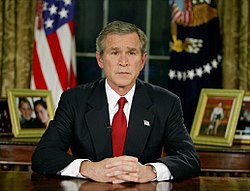Important Effects to the US-Iraq War of 2003
Welcome back to another blog post! This time, I want to talk about the United States' intervention in Iraq in 2003. Although a common theme that is shared regarding the war in Iraq was that it was due to claims of the harboring of weapons of mass destruction. When looking at the war from a holistic view, we quickly can understand the greater effects that caused the Bush administration to lobby hard for the invasion.
 |
| Ahh yes, George W Bush. A former Oil executive turned President shared with the American people that we should be concerned about WMDs in Iraq in 2003. (Source) |
I think that the most important reason why the United States wanted to get involved in Iraq was to secure both the oil reserves that Saddam Hussein's regime was restricting and to also have a regional presence in one of the world's top-producing oil nations. Of course, it is important to recognize that there were clear indicators in the United States government that the invasion and democratization of Iraq would actually not be as welcomed of an action by the locals (Gause, 2010).
An interesting discussion that can be added to the Iraq War topic comes from the book we have been reading in my International Politics of the Middle East course, The International Relations of the Persian Gulf by Greg Gause. One of the quotes from the book that resonates the most is located in the conclusion of his text, "one does not need to be a rocket scientist, or even a political scientist, to know that oil is the reason why the outside world is interested in the Persian Gulf (Gause, 2010, 245). I think that shared understanding of the Iraq war, the general public doesn't take this fact as seriously as they should. Because of this, we saw the invasion of Iraq by the US based on some relatively weak claims that were hard for the US to convince even some of its most stark allies in the UN to support.
 |
| Just in case you need a refresher on the location of the Persian Gulf and the regional actors in the area. (Source) |
With this all being said, both the regional presence of the United States along with the abundance of oil in Iraq was the most important outcomes to the regional politics of the region. Why you may ask? Let us break it down:
First, as the USA is interested in a regional actor, particularly one that was on edge with Iran, the USA's influence on the Iraqi Baathist party and the people overall likely inflamed anti-American ideals and potential extremism within the country. Today, we still are not on excellent terms with Iraq, and the country is still quite unstable due to the massive infrastructure losses that occurred through two massive wars with the USA in the past 50 years. For the USA, it's clear (as Gause has shared) that although Iraq isn't the first choice of an ally in the region, it is one of the most important strategic allies in the regional resistance over Iran and Saudi Arabia (a huge oil producer and US ally).
 |
| I always find this map interesting to look at when discussing US Interests abroad, particularly in the MENA Region. (Source) |
Second, we know that one of the critical interests of the United States in the Middle East is Israel's security. So although the Iran-Saudi Arabian interests (regarding oil security for the United States) is essential, we also know that the United States and the regional actors are concerned about Iran developing potential nuclear weapons. Of course, If this happens, we may see arms races in the region, nuclear weapons reaching the hands of non-state actors, or other less-than-ideal situations occurring with the nuclearization of the region. This of course likely played a major role in the Bush administration's ability to convince the American public that Iraq was possibly harboring or producing weapons of mass destruction, but its still a critical theory to understand.
Well, thanks for tuning in and reading my brief discussion on the Gause book and the more significant implications for the United States and regional actors in the Middle East. Until next time!
Oh, also, feel free to check out Gause's book:
Gause, F. Gregory. The International Relations of the Persian Gulf. Cambridge University Press, 2010.

This blog is truly interesting. I hear more and more that the initiative of the "New World Order" was USA's new initiative on cooperating with the international community and in particular the countries of the Middle East in a very different manner. I find the second map very informative. I wonder if these maps are updated based on the friendship that the United States has with the countries or because of a real security problem.
ReplyDeleteI really enjoyed your post. I thought you did a really good job of discussing a complex issue in a clear way while even adding a bit of humor. Your choice to include the map of US State Department Travel Advisories was fascinating to me: I wonder what measurements the State Department used to create these maps. I also wonder how US interests abroad influence where it is considered safe to travel, and how these maps, specifically in MENA, changed before and after the 2003 invasion.
ReplyDelete